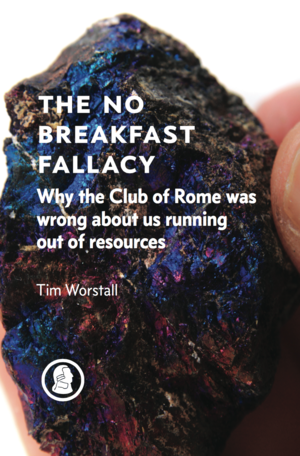Questions to which the answer is no
The answer here is no. The Institute of Metals wonders whether rising prices and a market shortage are going to stymie technological development.
No.
The BBC wonders whether whether we might have to worry about smartphone rationing:
Could you cope with smartphone rationing?
No.
Further:
A number of metals are crucial components in a range of technologies, from smartphone batteries to electric cars. So could a market shortage and spiralling prices put the brakes on the global tech industry?
No.
Firstly we've the obvious point that rising prices are the solution to a "market shortage," rising prices make market shortages go away. Suppliers are induced, by their lust for lucre, to produce more, users are, by their distaste for having to part with pelf, persuaded to use less.
Prices are the damn rationing system that is.
We've also dealt with this at near book length. There simply is no mineral or metal we're going to run out of in anything like a human timescale. Sure, we might have to spend a little more digging up some bits of rock, might face variable prices while we attempt to incentivise people to do so but there simply isn't a shortage, isn't going to be a shortage, of anything we use to build our civilisation.
The answer is just no.
Sure there're more fat people around - ain't that great?
The New England Journal of Medicine tells us both that there are more fat people around and also that this is leading to a rise in certain diseases. To which our response is, ain't that great?
The prevalence of overweight and obesity is increasing worldwide.
That's their opening line and we can't see anything to argue with there. They also tell us that the more developed a place the more likely it is to have a lot of fat people:
In 2015, at all SDI levels and for all age groups, the prevalence of obesity was generally higher for women than for men, with the highest prevalence among women between the ages of 60 to 64 years living in countries with a high SDI (Figure 1). In general, the prevalence of obesity among both women and men increased with the increase in the SDI across all age groups.
That SDI is the sociodemographic index and yes, it reads that a higher number means a more economically developed nation.
All of which we would say is greatly cheering. Certainly, there are aesthetic reasons for not desiring too many fat people around but the basic underlying story here is that we've solved the great and original human problem. How do we produce enough food to keep everyone alive?
For we note that before about 1820, just as the Rev Malthus sat down to write it all out, the major limitation upon population size (in both senses, number of people and size of people) was the ability to produce enough food. People really did drop dead from lack of it. As Amartya Sen has pointed out modern famines are more about politics and inadequate - even purposefully so - reactions to dearth but there were millennia upon millennia where people really did starve down to skeletons then die through no one's fault nor intention.
That the world is now roamed by those too large for yoga pants might indeed be a problem of sorts but it's a very different one, it's one that stems from our having solved the basic and long running human problem of what's for lunch. The solution brought to you, of course, by private property, trade, free markets and capitalism.
This also illustrates a core contention of economics, that there are no complete solutions, only a series of trade offs. We are where we might have to worry about the prevalence of diabetes, rather than which one of our children, or even all of them, will starve in the next couple of years. We can't help thinking that this is an advance in the human condition.
At which point of course The Happy Dance even if the size and weight of us all makes it an unedifying sight.
This seems like an entirely sensible taxation decision to us
Private sector, or at least charitable status, schools receive a discount upon their business rates bills:
Private schools are set to get tax rebates totalling £522m over the next five years as a result of their controversial status as charities, according to a study of local council records.
Charitable organisations in England and Wales are entitled to relief of 80% on the business rates payable on the buildings they use, and some of the country’s best-known private schools qualify under the rules.
State sector schools do not. But then of course that's just a budget merry go around as the local authority handles the funding for said schools and then collects the money back again through the budget process. Yes, it is right that things owned and run by the state pay such taxes, just as we charge the Armed Forces for the spectrum they must have. Just the budget line, even if it is just shuffling, does concentrate minds on whether quite so much of something is needed.
But we do think this is a good idea this discount:
CVS said Eton College, whose former pupils include David Cameron and Boris Johnson, would have faced a bill of £4.1m for business rates over the next five years without its charitable status, but instead it would pay just £821,040.
Dulwich College in south London, which educated former Ukip Leader Nigel Farage, will only pay £786,752 out of its £3,933,760 five-year bill under the tax regime.
Leeds grammar school, which offers extensive sports facilities on a campus of nearly 60 hectares (140 acres), will only pay £826,016 out of its £4,130,080 five-year bill.
There is just that basic rule of law idea of course. If charities don't pay full business rates then charities don't pay full business rates. Such deals, breaks or subsidies do not apply just to those charities which you approve of nor should they be denied them because you don't. If x structure or activity is to be taxed in y manner then x structure or activity is taxed in y manner, whatever the hell you think about it, that's what the rule of law means.
But we would add one other point. The Grammar School at Leeds, as it is now, educates some 1,500 pupils a year. That relieves the local authority of, at the roughly about right £5,000 a year per pupil cost of state schools (that price is arguable, as the usual calculation doesn't include either the capital budget nor the pensions), costs of some £7.5 million a year. Or, over the 5 year period being talked about, £37,500,000. That seems worth a less than 10% of the savings break on the tax bill, doesn't it?
At which point we should note that the state makes a vast, gargantuan, profit out of the existence of private schools. So why are people whining about the trivia of the tax bill?
Close run thing
Labour under Jeremy Corbyn did not win the election, but they came perilously close to it, and hardly anyone saw it coming. They might have won but for two things that contributed to their failure. The two terror attacks during the campaign received extensive media coverage. This meant there was less space for election coverage of Theresa May’s wooden ineptitude or Jeremy Corbyn’s cornucopia of goodies.
Fatal to Labour’s hopes, however, was Ruth Davidson’s achievement in Scotland. The additional 12 Tory seats saved not only the government, but the Union itself. The SNP’s price for supporting a Corbyn led coalition would have been a second referendum. That will not now happen. And the 12 extra Tory seats take them over the threshold needed to govern.
The arithmetic is now this: With Sinn Fein not taking their seats and the Speaker not voting, that leaves 642; so 321 are needed to govern. The Tory 318 and the DUP 10 make 328, giving a working majority of 14, close to that of the previous parliament.
The idea that young people turned out in droves to back a hard left agenda is not supported by the figures, which show that only 9% of Labour’s vote came from the 18-24 group. A larger share was from the 35-45 group. Furthermore, the seats which had a higher than average population in the 18-24 age group did not perform much better for Labour than the others.
The result was partly caused by a worthless Tory manifesto which gave people no reason to vote for them. Conservative statism offered nothing, not even vision. And the Conservatives alienated their own power base among the elderly by pledging to dissipate their assets and the value of their homes to pay for social care.
There was an assumption in Downing Street that the election would be about Brexit, but it was about traditional issues of housing, education, health, transport, pay, etc.
It is not true to say that half the country suddenly decided to vote for Venezuelan-style socialism. It is much more likely that they voted for goodies offered by Jeremy Corbyn rather than the empty platitudes offered by Theresa May.
A few percent more of young people voted for a £10 minimum wage, affordable housing and free university education. A few percent more of older people voted against losing pension rights and forfeiting their assets and much of the value of their homes to fund social care. This is enough to explain what happened.
Labour came close to snatching a surprise victory, but they lost, and the Tories will learn the lesson and behave differently in future.
Tax Freedom Day is here!
Yes—the day you've been waiting for is finally here.
For every day of 2017 up to and including most of June 11th, every pound the average Brit earned went to Philip Hammond and the government. June 12th is the first full day where the national income is being paid into your pocket, and not to the taxman.
To learn more about Tax Freedom Day—how it is calculated, how it has changed over time, and what it really means, go to our Tax Freedom Day info page or read my CapX essay explaining it in detail.
And for more info on why we at the ASI think too much tax can be damaging, read my explanation of the ASI's tax research and priorities—there are many links there to info and arguments about taxation in the UK and around the world.
Well, there's your problem then
True to form Philip Blond, he of "Red Toryism," is calling for more of what just did not work. That is, the way to win the hearts and minds of the British people to to offer a milquetoast version of what others are offering the full fat version of:
“Thanks to Jeremy Corbyn Red Toryism is needed now more than ever, because it is the only thing that the party has in the box to match it.”
We do not, of course, agree with this analysis indeed we've been somewhat impolite about Blond before now. Nick Timothy's ideas o seem to run in this vein though and this is as neat an encapsulation of them as we've seen:
Timothy presumably believed that he had found an electoral sweet spot, marrying together a more leftwing, interventionist approach to economics with a more rightwing socially conservative vision.
An encapsulation which we entirely disagree with. For a leftwing, in what is absurdly called "liberal" these days, economic policy is indeed more interventionist. And so is a socially conservative set of policies, it's more interventionist. As in the economics the interventions being no, you must not do it that way, don't do what you wish as long as you're not harming others, you must, under the pressure of the law, do it this way. So it is with socially conservative policies, they are interventions insisting no, you must not do it that way, don't do what you wish as long as you're not harming others, you must, under the pressure of the law, do it this way.
It is we neoliberals, we happy few, this band of siblings, who keep the true liberal flame alive. Do as you wish as long as you're not damaging the the rights of others to do the same. That is, a less interventionist set of policies on both economics and society.
Wouldn't it be interesting if a political party went to the country on that manifesto?
So that's another problem pretty much solved then
We don't have to go too far to find the miserablists who insist that we're all doomed, doomed I tell 'ee, because the human population is growing uncontrollably. Half the environmental publications on the planet harp on about this. And near every piece anyone at all writes on the subject of growth, or environmental limits, will have someone pop up in the comments insisting that we just must stop the peasantry having so many damn children.
What this misses is that we've already solved this problem. And yes, it has indeed been solved by that heady mixture of free markets and capitalism, that thing we call neoliberal globalisation. This little snippet proves it:
Three men who have fathered nearly 100 children among them are doing their bit for Pakistan’s skyrocketing population, which is being counted for the first time in 19 years.
But in a country where experts warn the surging populace is gouging into hard-won economic gains and social services, the three patriarchs are unconcerned. Allah, they say, will provide.
Pakistan has the highest birth rate in South Asia at around three children per woman, according to the World Bank and government figures, and the census is expected to show that growth remains high.
That really is patriarchy of course. But what drives population size is not how many wives a man might have but how many children per woman, it is that 9 months in the womb which is the bottleneck. Two children per woman and the population falls over time - after the demographic effect of increasing lifespans - and 3.8 means a doubling every generation. Assuming that all children survive of course.
Historic fertility rates have been up at 7 and including pregnancies, still births and so on higher again. That is what led to Malthusian growth of course, the productive capacity of society was the limiting factor in how many did survive. When that capacity expanded then more survived and growth became an expansion of the population living at the same old standard rather than an increase in the level of living.
Shifting a society over to where most to all children survive, in itself a measure of increased wealth, means that people entirely voluntarily have fewer children. There are other things to do in this life after one has ensured the existence of grandchildren, after all. And this has happened where those free markets, that capitalism, have taken root. And so an increase in the productive ability of society starts to lead to an increase in living standards instead of an increase in population.
That is, Garrett Hardin was wrong to apply the Tragedy of the Commons to population, even as his analysis of the basic problem itself was correct. Neoliberal globalisation reduces population growth.
Sure, a fertility rate of 3 does mean that population is still growing. But note that's the highest in South Asia. It's also fallen considerably in only a generation and the only way any of us see it going is further downwards.
There is no rich country anywhere near that replacement rate of 2.1, absent immigration. Poor countries are all approaching it from the upside. To the extent that human population growth is a problem it's one that we've already largely solved.
So, what's the next thing this neoliberal globalisation is going to solve? Even the UN is saying that it will solve absolute poverty within the next couple of decades. So, what then after that?
Ed Conway says Bitcoin could turn capitalism on its head
We think this is a deeply unlikely outcome:
Bitcoin could turn capitalism on its head
The insight is, apparently:
In much the same way as the least interesting thing about Wikileaks is Julian Assange, the least interesting thing about bitcoin is the currency itself. What really matters is the technology sitting behind it, a kind of cloud database created alongside the currency by its pseudonymous creator Satoshi Nakamoto.
The blockchain, as he called it, is a register of every bitcoin transaction ever made. With most currencies, electronic transfers are recorded by banks and payment systems, presided over by a central bank. With bitcoin those transactions are logged by volunteers’ computers around the world, all of them constantly chugging away, processing and verifying each transaction. Equally interesting is the way those computers — or rather their users — are incentivised to be part of the network: if they are the first to verify a transaction, they get rewarded with more than one bitcoin of their own.
The blockchain might be a more efficient method of doing this than the current one - although we're deeply, deeply, unsure about that efficiency - but an overturning of the manner in which capitalism works?
Seriously, putting the Land Registry into the cloud changes capitalism? Replacing Capita, Equiniti and Computershare as share registrars with a decentralised system is a radical change?
Even the idea of non-government fiat money isn't all that much of a change. Bitcoin is fiat money itself and we've always had non-governmental forms of that. Whose round is it next is an informal type of fiat money.
Bitcoin and associated ideas might well be interesting and even transformative but a new method of registering ownership of assets is hardly a change to capitalism now, is it? Given that capitalism itself is a system which depends upon , exists because of, the individual ownership of assets which we track so that the system itself works.
The latest proof of an oft repeated contention of ours
There's a new book out in the US, Dream Hoarders, which essentially says that the upper middle class (which for Americans is the 79% to 99% or so) are getting all the good gigs and positions in life because they're protecting their own children. No one can get a look in from outside the gilded group because you've got to go through a certain formulaic development process to gain entry to it.
The right college, unpaid internships and so on, the right college being predicated on being able to do all the correct extracurricular things at high school and so on.
We're not sure about this analysis to be honest, those "right" US colleges do rather bend over backwards to make allowances, to welcome in, those who are not from this background. Yet we do agree that there's far too much credentialism around.
But to our oft repeated contention:
As Reeves notes, this is not usually due to direct classism, although he’s appalled that American universities admit to giving preferential treatment to “legacy” students. Rather, those who got a head start in life are set up to succeed from the very beginning, when they attend well-funded public elementary schools, to the middle, when they get internships because of who they know. (I would also add that only the upper crust can afford to do unpaid internships.)
It's that bit about well funded public elementary schools. For if you look at actual school budgets per pupil around the US the most surprising fact is that the inner city schools tend--with obvious exceptions like the occasional rich enclave--to be very well funded indeed. Baltimore, the scene of The Wire, is regularly listed as being among the highest spending districts in the country.
We would, of course, entirely agree that a decent elementary education is going to be the starting point for any form of climb in a society. But this does bring us to that contention. It's not how much money is spent that matters, but how the money is spent which does.
America's inner city schools can indeed be entirely appalling, but they're not short of money, short of money in the system that is, rather than in the schools themselves.
The US leaving the Paris Accord Just doesn't matter
Actually, we can argue that whether anyone signs up or doesn't to the Paris Accord isn't a matter of importance. For here's some talking about the effects of the US not remaining:
Existing climate efforts expected to keep US goals on track
More specifically:
The momentum of climate change efforts and the affordability of cleaner fuels will keep the United States moving toward its goals of cutting emissions despite the Trump administration's withdrawal from the Paris global accord, business and government leaders in a growing alliance said.
In detail:
The momentum of existing climate-change efforts and the availability natural gas, wind and solar power mean those loyal to the Paris accord in the U.S. will have an easier time, with emissions expected to fall overall for years, said Robert Perciasepe with the Center for Climate and Energy Solutions, who worked with Bloomberg's group on the climate pledge.
Some studies suggest the United States will cut emissions as much as 19 percent by 2025 if it simply moves forward as is, he said. That's not far from former President Barack Obama's goals for a reduction of 25 to 28 percent as part of the Paris accord, Perciasepe said.
If it doesn't matter much whether the US is in or out of Paris then Paris itself doesn't matter very much, does it?
Which underlines a point we continually make. The world has already done rather a lot to create the possibility of reduced emissions. Absolutely all of the predictions of future emissions - such as this one in The Guardian - resolutely ignore what has already been done. Those charts you see going off into infinity are ignoring the manner in which we're already closing or have closed coal stations, we've brought solar power down in price by an order of magnitude, people are already buying electric cars and so on and on.
Leave aside the basic contentions for a moment and consider this important detail. The predictions of total disaster are all based upon our doing nothing at all. Yet we've done a lot, we are already quite obviously not on the higher emissions pathways. Thus the predictions of total doom are simply wrong for we've already done quite a lot about it.
Hey, maybe we need to do more, maybe we don't, but we should at least start from the current position, not the predictions based upon our having done nothing for 20 years, for we've not done nothing in those decades.











